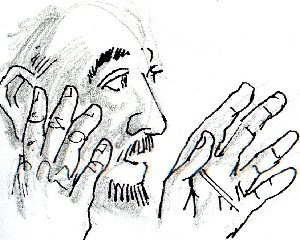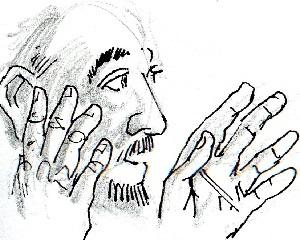

“Do you see anything?” (Mark 8:24).
Today’s readings are about seeing accurately. St. James uses a wonderful metaphor to describe someone who hears the word but doesn’t do it. He is like a man who looks at his face in the mirror, but then goes off forgetting what he looks like. What good is it to see the truth but not put it into action? In today’s Gospel, Jesus heals a blind man in a curious, two-stage process that suggests he is still learning how his healing powers work. Mark’s Gospel, the earliest of the four, emphasizes Jesus’s humanity in this way. But his description also compares Jesus to God in Genesis, when God forms Adam from clay and blows moist breath into him.
Earlier in Mark, Jesus healed a deafmute by taking him aside from the crowds, using spittle and puttiing his fingers in the man’s ears, saying, “Ephphatha,” Aramaic for “Be opened.” In the same way, he now takes the blind man aside and touches his eyes with spittle, then asks him if he can see anything. When the man says he sees “trees walking,” Jesus touches his eyes again, and the man clearly sees that they are people.
This story of gradual sight may be really about how all of us come to faith in stages. Jesus’ disciples slowly recognize who he is, and though the scribes and Pharisees claim to see, they are deliberately blind to him and the meaning of his ministry. Only by his death and resurrection are the eyes of many opened to Jesus as the firstborn of the New Creation, revealing the full image and likeness of God.
St. Paul also describes our growth in Christ as looking into a mirror but seeing only partially: “For now we see in a mirror, dimly, but then we will see face to face” (1 Cor 13:12). Or the first letter of John says this: We know that when Christ appears, we will be like Him, for we will see Him as He is” (1 John 3:2).
The Gospels make clear that the first prayer is for faith, or sight. If we can see God at work in us and in the world, then we can participate in our own maturity and share in the redemptive mission Jesus began. Few of us learn to see in a flash of light or dramatic conversion like Paul's. We learn slowly and in stages through crises and doubts, each time committing ourselves more deeply to the road of faith. The perfect prayer is the one prayed by the blind beggar Bartimaeus when Jesus asked him what he wanted him to do for him. He cried out, “Lord, I want to see.”
Advertisement





